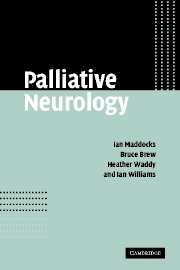Book contents
- Frontmatter
- Contents
- Foreword
- Note on drugs and abbreviations
- Section I Palliative Management
- Section II Major discomforts in advanced neurological illness
- Section III Major neurological conditions requiring palliation
- 1 Cerebrovascular disease: stroke
- 2 Demyelinating disease
- 3 Parkinson's disease and related disorders
- 4 Dementia
- 5 Amyotrophic lateral sclerosis (motor neurone disease)
- 6 Incurable Infections of the nervous system
- 7 Muscular dystrophy
- 8 Neuropathies
- 9 Huntington's disease
- 10 Cerebral neoplasms
- 11 Sequelae of traumatic brain injury
- Section IV Ethical issues
- Section V Appendices
- Index
4 - Dementia
from Section III - Major neurological conditions requiring palliation
Published online by Cambridge University Press: 08 January 2010
- Frontmatter
- Contents
- Foreword
- Note on drugs and abbreviations
- Section I Palliative Management
- Section II Major discomforts in advanced neurological illness
- Section III Major neurological conditions requiring palliation
- 1 Cerebrovascular disease: stroke
- 2 Demyelinating disease
- 3 Parkinson's disease and related disorders
- 4 Dementia
- 5 Amyotrophic lateral sclerosis (motor neurone disease)
- 6 Incurable Infections of the nervous system
- 7 Muscular dystrophy
- 8 Neuropathies
- 9 Huntington's disease
- 10 Cerebral neoplasms
- 11 Sequelae of traumatic brain injury
- Section IV Ethical issues
- Section V Appendices
- Index
Summary
Dementia is the term used for a number of conditions in which there is intellectual deterioration accompanied by a progressive decline in independence and a shortened life expectancy. Alzheimer's disease is the most frequent diagnostic label; it indicates a primary disorder of neurones and a characteristic neuropathology. There are a number of other causes of dementia, including fronto-temporal and Lewy body types. Cerebrovascular disease is a common additional cause.
Old age is the strongest risk factor for dementia, and it has been estimated that its prevalence in the USA in person over 80 years of age exceeds 20%. The increasing proportion of elderly persons in virtually all populations indicates a progressive and global rise in the burden of care for demented persons.
The focus of this discussion will be on Alzheimer's disease, in which four stages may be recognized in its evolution and progress, though these are rarely clearly defined:
An early stage when mild cognitive impairment limits ability to perform routine complex tasks such as cooking, but allows self-care in matters of personal hygiene.
A moderate stage in which the individual is able to walk without help, but needs assistance to undertake basic activities of daily living, and requires oversight to prevent unsafe activity.
A severe stage in which the individual is unable to walk without help or self-feed, but there is preservation of basic communication.
A final stage with inability to walk even with assistance, or to communicate in any meaningful way.
- Type
- Chapter
- Information
- Palliative Neurology , pp. 148 - 154Publisher: Cambridge University PressPrint publication year: 2005



